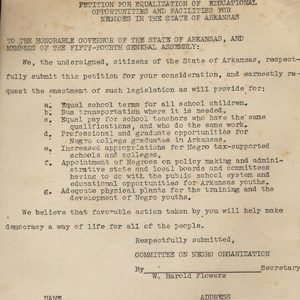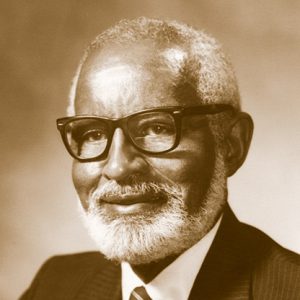calsfoundation@cals.org
Committee on Negro Organizations (CNO)
The Committee on Negro Organizations (CNO) was an Arkansas-based civil rights organization that focused its efforts on voting rights. Seeking both to expand the voting opportunities for the state’s African American population, as well as their voting participation, it was a forerunner of the movement whose efforts came to fruition with the enactment of the national Voting Rights Act in 1965.
The CNO was organized by Pine Bluff (Jefferson County) attorney William Harold Flowers. Flowers had previously written to Walter White, executive secretary of the National Association for the Advancement of Colored People (NAACP), requesting assistance for the local chapter of the NAACP. However, NAACP attorneys Charles Hamilton Houston and Thurgood Marshall replied with little more than sympathy. Consequently, Flowers took it upon himself to start a new civil rights organization, one which became known as the Committee on Negro Organizations, which took form at a March 1940 meeting in Stamps (Lafayette County), Flowers’s home town. In fact, his mother, Beulah Lee Sampson Flowers, was an early supporter of the organization.
As historian John Kirk has written, “Although the ‘independent’ programme of the CNO was essentially the same as that put forward by the NAACP at the time, it set itself apart in one very important aspect: it was entirely community oriented. As the NAACP concentrated on winning court rulings which would have a national impact, the CNO focused on the immediate needs of those living in Arkansas.” Indeed, Flowers wanted the CNO to be a vehicle for uniting the range of existing Black political, civic, fraternal, and religious organizations into a singular force whose focus was to achieve greater voter registration. He sought to have the state’s Black residents start to purchase poll tax receipts and then cast their votes in the election. While a die-hard Republican himself, Flowers hoped that such actions could also serve to challenge the state Democratic Party’s all-white primaries (before the 1944 U.S. Supreme Court case of Smith v. Allwright finally outlawed exclusively white primary election). Under Flowers’s leadership, the number of eligible Black voters in Arkansas grew from 1.5 percent to 17.3 percent in the period from 1940 to 1947. In terms of active voters, those percentages translated into an increase from 4,000 voters to 47,000 voters.
Such success raised the profile of Black activism in the state, as did another development—a 1942 lawsuit by Little Rock (Pulaski County) teacher Sue Morris, who was seeking a balance of salaries between white and Black teachers in the Little Rock School District. The suit was decided in her favor in 1945, the same year that the national NAACP brought state branches together as the Arkansas State Conference of Branches, with Flowers being placed in charge of recruitment efforts. As Kirk has written, “The CNO gradually became a victim of its own successes. Along with the NAACP moving into the state, the political empowerment of the black community gave rise to a new set of local organizations dedicated to mobilizing the vote and using it as a tool with which to carve concessions from the white community.” In 1948, Flowers was elected president of the Arkansas State Conference of Branches of the NAACP, the CNO was dissolved.
For additional information:
Kilpatrick, Judith. There When We Needed Him: Wiley Austin Branton, Civil Rights Warrior. Fayetteville: University of Arkansas Press, 2007.
Kirk, John A. “‘He Founded a Movement’: W. H. Flowers, the Committee on Negro Organizations and Black Activism in Arkansas, 1940–1957.” In The Making of Martin Luther King and the Civil Rights Movement in America, edited by Brian Ward and Tony Badger. London: Macmillan, 1996.
———. “The Legacy of William Harold Flowers.” Arkansas Times, February 1, 2018, pp. 16–19. Online at https://arktimes.com/news/cover-stories/2018/02/01/the-legacy-of-william-harold-flowers (accessed January 15, 2022).
———. “The Long Fight for the Vote.” Arkansas Times, February 4, 2015. Online at https://arktimes.com/news/cover-stories/2015/02/04/the-long-fight-for-the-vote (accessed December 17, 2021).
“William Harold Flowers, Sr.” Arkansas Black Lawyers. https://arkansasblacklawyers.uark.edu/lawyers/whflowers.html (accessed December 17, 2021).
William H. Pruden
Ravenscroft School
 Civil Rights and Social Change
Civil Rights and Social Change World War II through the Faubus Era, 1941 through 1967
World War II through the Faubus Era, 1941 through 1967 CNO Petition
CNO Petition  William Harold Flowers
William Harold Flowers 



Comments
No comments on this entry yet.